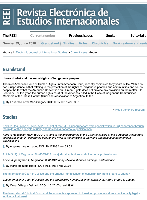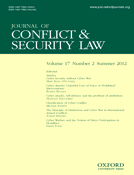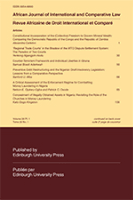
COLUMBIA JOURNAL OF TRANSNATIONAL LAW
Scope & Guideline
Bridging Borders through Legal Insight.
Introduction
Aims and Scopes
- Transnational Legal Studies:
The journal focuses on the complexities and dynamics of law that transcend national boundaries, examining how legal systems interact and influence each other in a globalized context. - Comparative Law:
It emphasizes comparative analysis of legal principles, systems, and practices, fostering a deeper understanding of how different jurisdictions approach similar legal challenges. - Human Rights and Governance:
The journal addresses issues related to human rights law and governance, exploring mechanisms for enforcement, compliance, and the role of international bodies. - International Relations and Law:
It investigates the relationship between international law and geopolitical dynamics, including state behavior, sovereignty, and the impact of global governance structures. - Environmental and Resource Law:
The journal engages with legal frameworks governing environmental protection, resource management, and sustainable development, particularly in the context of transnational challenges. - Emerging Technologies and Law:
A focus on the implications of technological advancements on legal frameworks, including issues surrounding cybersecurity, data privacy, and the regulation of artificial intelligence.
Trending and Emerging
- Impact of Digital Transformation on Law:
There is a growing emphasis on how digital technologies and cybersecurity issues are reshaping legal frameworks, reflecting the increasing relevance of technology in transnational legal discourse. - Global Human Rights Mechanisms:
An uptick in articles addressing innovative approaches to human rights enforcement, including the use of international legal tools and principles to enhance accountability and protection. - Environmental Justice and Sustainability:
Emerging themes around environmental law focus on sustainability and justice, particularly regarding transnational environmental challenges and the legal implications of climate change. - Comparative Constitutionalism:
The journal is increasingly exploring comparative constitutional issues, analyzing how different countries are adapting their constitutions in response to global challenges and domestic pressures. - International Trade and Economic Law:
There is a noticeable rise in discussions surrounding trade policies and their implications for international relations, particularly in the context of economic disparities and globalization.
Declining or Waning
- Traditional Sovereignty Issues:
Discussions surrounding traditional notions of sovereignty and state-centric legal frameworks have become less frequent, as the journal increasingly emphasizes transnational legal interactions and global governance. - Conventional International Criminal Law:
There appears to be a decreasing focus on conventional topics within international criminal law, as the journal pivots towards contemporary issues such as accountability mechanisms and reparative justice. - Static Regulatory Approaches:
Themes related to static regulatory frameworks, particularly in environmental law, are waning, possibly due to the journal's shift towards more dynamic and adaptive approaches to legal challenges.
Similar Journals

National Taiwan University Law Review
Illuminating the Evolving Landscape of Asian LawNational Taiwan University Law Review, with ISSN 1812-6324, is a prestigious academic journal published by the NATIONAL TAIWAN UNIVERSITY COLLEGE OF LAW. As a pivotal platform in the field of law, this journal aims to foster scholarly discourse and promote the exchange of ideas regarding legal theories, practices, and developments, particularly within the context of Taiwan and the broader Asian legal landscape. Although it does not currently offer open access, its selectivity ensures a high standard of peer-reviewed research, appealing to researchers, legal practitioners, and students alike. The journal's commitment to exploring contemporary legal challenges and ideologies positions it as an essential resource for those seeking to enhance their understanding of the dynamic legal systems in Asia and beyond. Located in Taipei City, Taiwan, the National Taiwan University Law Review invites contributors and readers who are passionate about advancing legal scholarship and practice.

Annual Review of Law and Social Science
Synthesizing Knowledge for a Just SocietyThe Annual Review of Law and Social Science, published by ANNUAL REVIEWS, is an essential interdisciplinary journal that bridges the domains of law, sociology, and political science. Established in 2006, this pivotal resource has consistently been recognized for its scholarly excellence, achieving a Q1 ranking in both the Law and Sociology and Political Science categories as of 2023. With a remarkable Scopus ranking that places it in the 93rd percentile among law journals, it serves as a vital platform for researchers and professionals seeking to engage with comprehensive reviews of contemporary issues at the intersection of these fields. Although not an open-access journal, its contributions are fundamental for advancing scholarship and fostering deeper insights into the relationship between social dynamics and legal frameworks. The journal's rigorous annual reviews provide valuable syntheses of the latest research, making it an indispensable resource for academics, policymakers, and students alike.

Revista Electronica de Estudios Internacionales
Bridging Theories and Practices in International RelationsRevista Electronica de Estudios Internacionales is a prominent academic journal dedicated to the exploration of international studies, published by the esteemed ASOC ESPANOLA PROFESORES DERECHO INT & RELACIONES INT-AEPDIRI. Based in Spain, this journal has embraced an Open Access model since its inception in 2000, allowing researchers, students, and professionals to freely access and disseminate significant findings in the field. With an ISSN of 1697-5197, the journal highlights critical issues surrounding international law and relations, maintaining a vital role in the ongoing discourse within the academic community. Currently categorized as Q4 in the Law field and ranked #755 out of 1025 within the Scopus database, the journal offers a platform for innovative thinking and scholarly contributions, which are particularly important in today's rapidly evolving global scenario. Explore the latest research and insights from 2019 to 2023 in this essential resource for those engaged in the study and practice of international relations.

UNIVERSITY OF TORONTO LAW JOURNAL
Fostering Critical Discourse in Legal StudiesUNIVERSITY OF TORONTO LAW JOURNAL, published by University of Toronto Press Inc, stands as a distinguished platform in the realm of legal scholarship, having served the academic community since its inception. With an ISSN of 0042-0220 and an E-ISSN of 1710-1174, this quarterly journal is not only recognized for its rigorous peer-review process but also boasts an impressive Q2 rank in Law and a Q3 rank in Sociology and Political Science as per the 2023 category quartiles. The journal aims to foster advanced knowledge and discourse on various legal issues, thereby appealing to researchers, professionals, and students alike who are eager to engage with contemporary legal debates. It is noteworthy that the journal currently does not offer open access, ensuring the integrity and quality of its publications for a subscribed audience. Published in Canada and available for a wide readership, the UNIVERSITY OF TORONTO LAW JOURNAL continues to be a pivotal source for critical analyses and fresh insights in the fields of law and social sciences, contributing significantly to the understanding and evolution of legal frameworks.

JOURNAL OF CONFLICT & SECURITY LAW
Pioneering Scholarly Discourse in Security LawThe Journal of Conflict & Security Law, published by Oxford University Press, is an essential source of scholarly information in the fields of law, conflict studies, and security policy. With an ISSN of 1467-7954 and an E-ISSN of 1467-7962, this journal has been a significant platform for rigorous academic discourse since its inception in 2005. It is recognized for its contributions to the legal frameworks surrounding conflict and security, currently holding a Q3 ranking in Law and Q4 in both Safety Research and Safety, Risk, Reliability, and Quality for the year 2023. With its Scopus rankings placing it in the 61st percentile in Social Sciences Law, the journal serves as a key reference point for researchers and professionals looking to navigate the complexities of contemporary security challenges. Though the journal is not open access, its detailed analyses are critical for informed policy-making and academic inquiry, making it indispensable for students, scholars, and practitioners alike. For comprehensive insights and empirical studies, Journal of Conflict & Security Law remains at the forefront of legal and security research.

African Journal of International and Comparative Law
Championing Research in International and Comparative LawAfrican Journal of International and Comparative Law is a distinguished publication that serves as a vital forum for scholarly discourse in the fields of international and comparative law, with a specific focus on legal issues pertinent to the African continent. Published by Edinburgh University Press, this journal boasts a respectable impact factor and finds its reputation bolstered by its strategic ranking within the Q3 category of law, according to Scopus metrics, where it occupies the 681st rank out of 1025 journals. Although it does not currently offer open access, the journal remains committed to fostering legal scholarship and providing critical insights that bridge the gap between theory and practice. The journal's coverage encompasses scholarly articles, case studies, and analyses of contemporary legal challenges from 2005 to 2024, making it an indispensable resource for researchers, practitioners, and students dedicated to advancing their understanding of international and comparative legal frameworks in the African context. The editorial team encourages submissions that contribute to the dialogue on legal reforms, human rights, and the impact of globalization on African law.

International Community Law Review
Shaping the Future of International Legal Thought.International Community Law Review, published by MARTINUS NIJHOFF PUBLISHERS, is a distinguished journal that contributes significantly to the fields of law and international relations. With an ISSN of 1871-9740 and an E-ISSN of 1871-9732, this journal serves as a vital platform for scholarly discourse on issues pertaining to international law, promoting a deeper understanding and engagement with complex legal frameworks and global challenges. Currently classified in the Q3 quartile for Law and Political Science and International Relations, the International Community Law Review ranks 475 out of 1025 in the Law category and 386 out of 706 in Political Science, reflecting a moderate impact in the academic community. Though it does not currently offer Open Access, the journal's extensive coverage from 2007 through 2024 ensures that it remains a relevant resource for researchers, professionals, and students. Published in the Netherlands, this journal aims to foster the development of international legal thought, support academic research, and facilitate discussions that shape modern international legal practices.

Utrecht Journal of International and European Law
Fostering Global Legal DialogueUtrecht Journal of International and European Law, published by UBIQUITY PRESS LTD, serves as a dynamic platform for the dissemination of scholarly research in the realms of international and European law. Since its inception as an open-access journal in 2013, it has provided unrestricted access to cutting-edge legal scholarship, fostering global dialogue among legal professionals, researchers, and students. With a notable Scopus rank of 249 out of 1,025 in the law category and a commendable Q3 rating, the journal emphasizes innovative legal theories and practices relevant to contemporary global challenges. Located in the heart of the United Kingdom, the Utrecht Journal is committed to maintaining high academic standards while also promoting the exchange of knowledge across borders, which is crucial given the ever-evolving landscape of international law. As it converges its focus from 2020 to 2024, the journal seeks to become an essential reference for those dedicated to the exploration and expansion of legal discourse in this vital field.

UNIVERSITY OF NEW SOUTH WALES LAW JOURNAL
Connecting Scholars, Professionals, and Students in Legal StudiesUniversity of New South Wales Law Journal, published by the University of New South Wales, Faculty of Law, is a leading academic journal that serves as an essential platform for discourse in the field of legal studies. With an ISSN of 0313-0096 and an E-ISSN of 1839-2881, the journal has been a beacon of legal scholarship since its inception in 1983. Operating from Kensington, New South Wales, Australia, it provides profound insights into various legal issues, emphasizing interdisciplinary perspectives by also being recognized in the fields of philosophy, sociology, and political science. While it maintains a Q3 ranking in Law and has shown increased visibility in Philosophy at Q2 according to the 2023 category quartiles, the journal assures a diverse range of critical analyses from scholars, professionals, and students alike. It is particularly valuable for researchers seeking to engage with contemporary legal debates, ensuring they remain at the forefront of academic and practical discussions in law and related disciplines.

University of Pennsylvania Journal of International Law
Empowering Legal Minds for a Global FutureThe University of Pennsylvania Journal of International Law is a pivotal academic publication that serves as a forum for groundbreaking legal scholarship, particularly in the complex and dynamic field of international law. Published by the University of Pennsylvania Law School, this journal supports a diverse array of interdisciplinary research and discourse, capturing insights that bridge legal, economic, and political landscapes. As of 2023, it is positioned in Quartile 3 in Law and Quartile 4 in Economics according to Scopus rankings, underscoring its relevance and contributions to legal academia. The journal is accessible through conventional methods, with its physical presence anchored in Philadelphia, Pennsylvania. With a commitment to fostering dialogue on both emerging and traditional legal issues, the journal aims to engage scholars, practitioners, and students alike, encouraging contributions that enrich understanding and drive progressive legal thought. This commitment to academic excellence ensures that the University of Pennsylvania Journal of International Law remains a vital resource for those seeking to navigate the challenges of international legal frameworks.